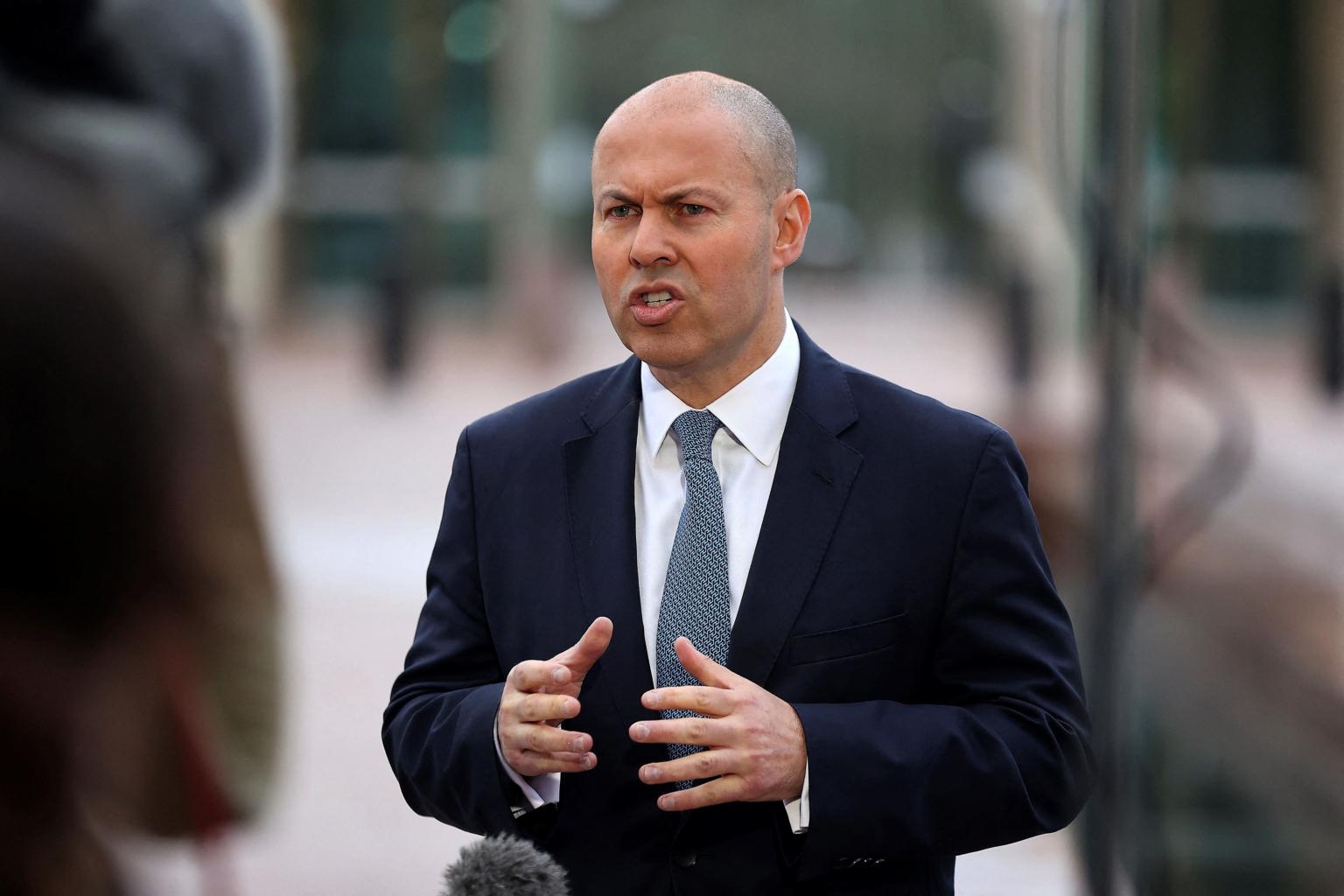Australian PM offers quick cash splurge to lure voters ahead of looming election
Sign up now: Get ST's newsletters delivered to your inbox

Australian Treasurer Josh Frydenberg talked up Australia's rapid fiscal improvement in his budget address on March 29, 2022.
PHOTO: AFP
Follow topic:
SYDNEY - Australia’s ruling Liberal-National coalition on Tuesday (March 29) delivered a generous budget aimed at helping households cope with soaring fuel and grocery prices ahead of a looming federal election.
Despite facing spiralling debt in the wake of the pandemic, the coalition committed to hefty increases in spending on health, aged and disability care, roads, and infrastructure. Warning about an “increasingly assertive China” and growing competition in the region, it revealed plans to lift defence spending above two per cent of gross domestic product to reach A$48 billion (S$49 billion) next year.
One of the biggest winners in the budget was the country’s cyber security and intelligence agency – the Australian Signals Directorate – which will receive an extra A$9.9 billion over the next 10 years and an extra 1,900 staff, including data analysts and computer programmers. The boost to the agency follows a series of cyber attacks - largely blamed on China - against Australian government agencies, Parliament, universities and businesses.
Delivering the budget in Canberra on Tuesday night, Treasurer Josh Frydenberg presented an upbeat picture of the economy.
He said Australia had successfully weathered a series of global crises and local disasters, including the pandemic, the war in Ukraine, and recent devastating floods in eastern Australia.
He said Australia’s resilient economy was highlighted by its AAA credit rating and its plunging unemployment level, which has dipped to four per cent - the equal lowest in 48 years – and is due to drop further to 3.75 per cent later this year.
“The last two years have been tough for our country, there have been setbacks along the way but Australia remains resilient,” Mr Frydenberg told Parliament.
“Our economic recovery is leading the world. This is not a time to change course.”
This year’s budget presented a much-needed opportunity for the ruling coalition to try to reverse its dismal position in opinion surveys ahead of the election which is due by May. According to the latest Newspoll survey, the opposition Labor party is currently preferred by a decisive 55 per cent of voters, compared with 45 per cent for the coalition.
The Prime Minister, Mr Scott Morrison, has struggled to overcome concerns about his handling of the Covid-19 vaccine rollout, his refusal to adopt a more ambitious climate change policy, and his response to bushfires and floods. He now faces concerns about rising inflation and looming increases to record low interest rates of 0.1 per cent.
But Mr Morrison appeared determined to use the budget to show that he was mindful of the current cost-of-living pressures caused by rising food and petrol prices.
The budget’s headline item was a A$8.6 billion package that included measures such as cutting petrol taxes by 22 cents a litre for six months and offering A$250 cash payments to six million pensioners and benefits recipients.
Despite this splurge – which was widely seen as a vote-buying spree – the federal deficit this year of A$80 billion is much better than expected. The government has received a massive boost to its coffers due to low unemployment, which has boosted tax revenue and reduced the need for welfare payments, and to booming prices of Australian coal and iron ore exports due to the war in Ukraine.
Commentators pointed out that most of the government’s generous handouts are temporary, meaning that they may help to win some much-needed votes in the coming weeks but will then be eclipsed by rising taxes and inflationary pressures that may further stress household budgets.
“This is a budget for the instant – unashamedly an election bribe, and unconcerned when that involves pursuing some poor policy,” wrote political commentator Michelle Grattan on The Conversation website.
Most political analysts believe the budget may not do much to turn around the coalition’s unpopularity, especially as Labor has signalled that it is likely to support many of the cost-of-living measures that are intended to entice voters.
“(This budget) is a ploy for an election, not a plan for a better future,” said Labor’s Treasury spokesperson, Dr Jim Chalmers.
Mr Morrison is expected to call an election within the next ten days, and possibly by the weekend.
That, combined with a wider reopening of the global economy as pandemic curbs ease, has prompted the government to upgrade its expectations for GDP and the labour market, with the unemployment rate seen dipping to a 50-year low of 3.75 per cent by September.
Data out on earlier on Tuesday showed retail sales jumped a solid 1.8 per cent in February, while spending on bank cards has held up well in March.
Those brisk conditions are expected to add to price pressures, with the government forecasting annual consumer inflation would hit 4.25 per cent in the current fiscal year, well up on the 2.75 per cent flagged in December, before moderating in the years ahead.
Such inflation would add to the case for the central bank to hike interest rates from record lows later this year, the first tightening since 2010.

